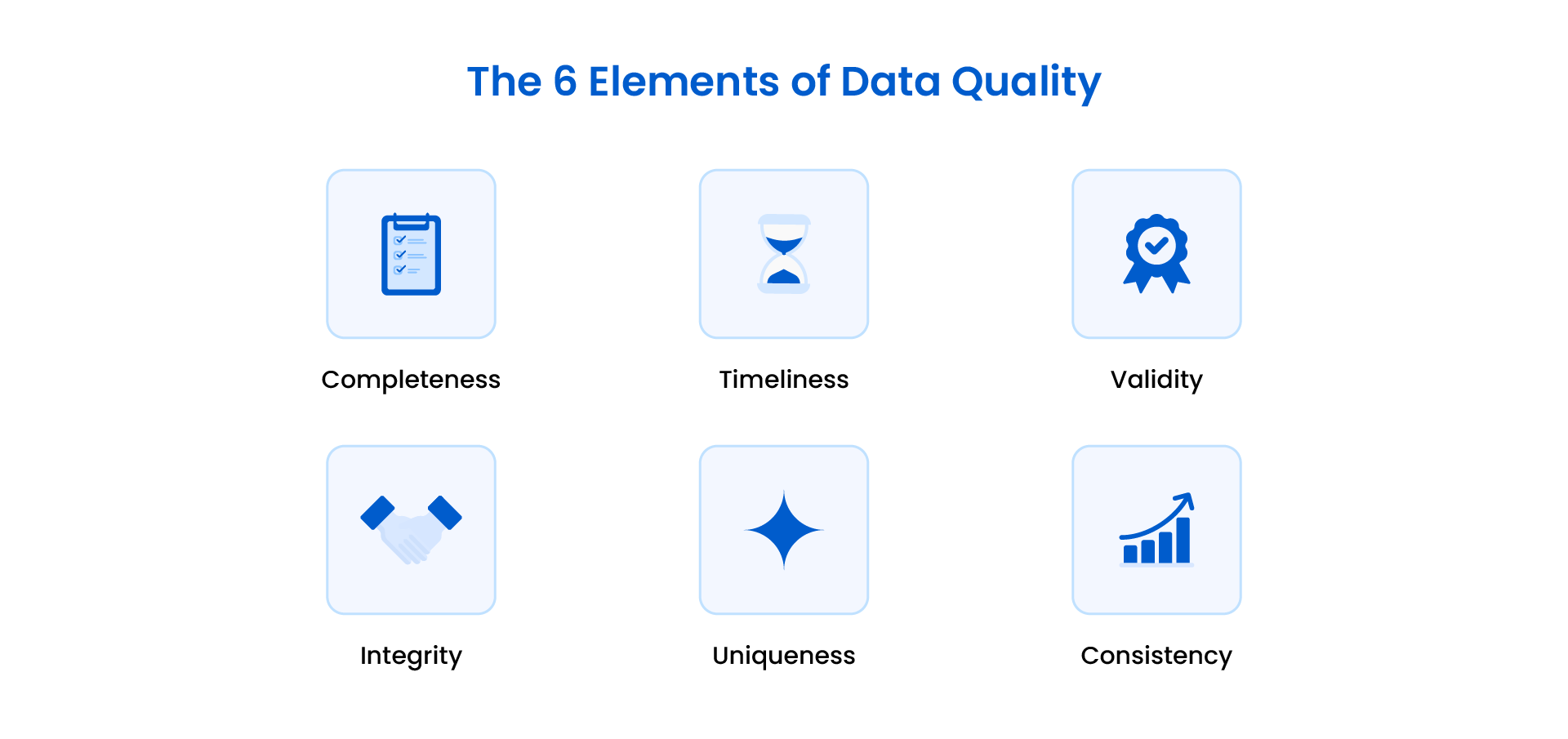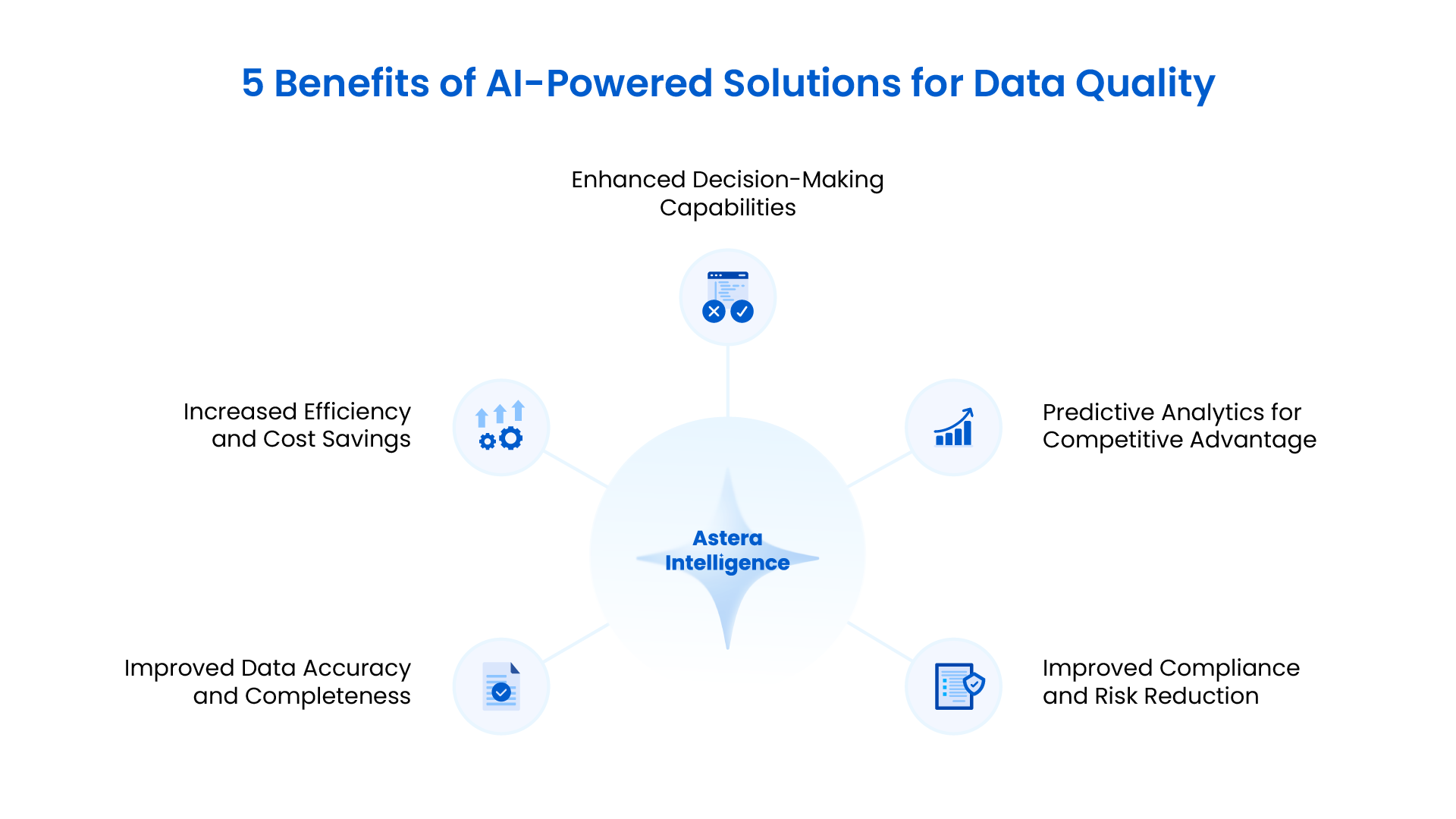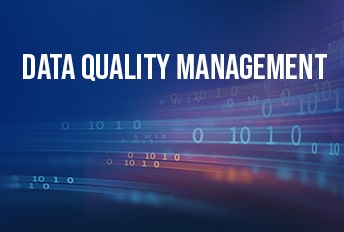
Why Your Organization Should Use AI to Improve Data Quality
Data’s value to your organization lies in its quality. Data quality becomes even more important considering how rapidly data volume is increasing. According to conservative estimates, businesses generate 2 hundred thousand terabytes of data every day.
How does that affect quality? Well, large volumes of data are only valuable if they’re of good quality, i.e., usable for your organization’s analytics and BI processes.

On the other hand, AI adoption is on the rise and as leaders explore the possibilities, there’s a significant opportunity to use AI’s transformative potential for data quality improvement. Using AI to enhance data quality is a powerful yet underappreciated application, holding immense benefits for organizations ready to embrace it.
Let’s look at why you should leverage AI to improve data quality organization-wide and how you can do this. Before we proceed, let’s define data quality so everyone’s on the same page.
What Is Data Quality?
Data quality is a measurement of how well your data meets your organization’s expectations across dimensions such as accuracy and validity. While the exact dimensions can vary case by case, the six common dimensions across which data quality is measured include accuracy, completeness, consistency, timeliness, uniqueness, and validity. While these are commonly used, you can also measure data quality across other dimensions. It’s important that the data is fit for your purpose, which can vary even across functions within the same business.
One common misconception is that data quality is interchangeable with data integrity. While both are crucial for data usability, they have different implications for your data management strategy.
Learn more: Data Integrity vs. Data Quality: All the Differences
4 Reasons Data Quality Should Be a Priority for Your Organization
Why should data quality be a priority for your organization? The short answer is that data quality directly and immensely impacts your business’s ability to make effective decisions, which can lead to improved efficiency and a competitive advantage. The flip side, as Gartner reports, is that poor data quality can cost your organization $12.9 million on average. Here are four crucial factors for your organization that are directly impacted by data quality:
1. Decision-making
The quality of your data dictates the quality of your decision-making. Working with low-quality data (the data may be incorrect, incomplete, or outdated) can lead to incorrect decision-making with short-term and long-term ramifications for your business. Conversely, high-quality data leads to effective and timely decision-making.
Zillow is an example of how low-quality data can lead to poor decision-making. The tech real estate company relied on incomplete datasets to predict prices for the houses it bought, resulting in a $300 million loss in a single quarter.
2. Customer satisfaction
High-quality data can also lead to increased customer satisfaction. Take Netflix, for example. The streaming giant is known for its high customer engagement and satisfaction rate because it leverages accurate and relevant customer data to deliver highly personalized recommendations. This has led to Netflix retaining its market share in a crowded streaming services space. Not only that, but Netflix also leads the pack in user satisfaction and enjoyment.
3. Efficiency
High-quality data can allow your company to increase efficiency. Analyzing past data for trends allows you to identify and address bottlenecks and inefficiencies. For example, Walmart and Amazon use data to make inventory management more efficient. Similarly, UPS leverages internal and external data for route optimization, which leads to operational efficiency and reduced environmental impact.
4. Predictive analytics & forecasting
High data quality is also crucial for accurate predictive analytics and forecasting. Gathering insights from high-quality data enables organizations to gain an advantage in strategic decision-making.
Proctor & Gamble (P&G) is a good example. The company uses data and analytics for demand forecasting. P&G combines historical sales data, real-time POS data, and external factors to manage its inventory better and reduce stockouts and overproduction. This leads to significant cost savings for the FMCG giant.
Enter AI: The Value of Artificial Intelligence to Data Quality
Now, let’s talk about AI. Businesses worldwide are interested in leveraging AI to improve their data management. However, AI for data quality deserves more attention. That’s because conventional approaches to data quality, such as manual data cleaning and rule-based validation, face several problems. These include:
- Poor data integration from siloed data sources,
- Manual data cleansing leads to inefficiencies,
- And the inability to scale with increasing data volumes.
Data cleansing and validation alone are resource-intensive processes that can take weeks, if not months, of work. AI can help by automating these processes so that your organization gets timely access to high-quality data.
In other words, by using AI to improve data quality, your organization can automate data cleansing, streamline data validation, detect anomalies in real-time, and adapt to new patterns in your data.
Deploy Astera Intelligence to Improve Data Quality
Astera Intelligence leverages AI to deliver quality data for your BI and Analytics. Work with high-quality data for higher-order decision-making.
Learn how Astera and AI improve your data quality5 Benefits of AI-Powered Solutions for Data Quality
AI-powered solutions can help you maximize your data quality, streamline data management, and make your data stack more efficient than ever. Here’s how:
1. Improved data accuracy and completeness
AI can detect errors, inconsistencies, and anomalies in your data more efficiently without the data volume being a hurdle. Trained AI can also automatically correct common errors, resulting in higher accuracy the minute your data is loaded from the source.
2. Increased efficiency and cost savings
Anyone who regularly works with data understands the pain of cleansing and validating data manually. AI automates these tasks, removing the need for manual data handling. AI can process large volumes of data at scale. This means your organization’s growing data needs can be managed without a proportional increase in effort or cost.
3. Enhanced decision-making capabilities
Leveraging AI for data quality gives you access to more accurate and complete data. This allows your organization to unlock insights previously obscured by poor data quality. This leads to informed, effective, and timely decision-making across all levels of your organization.
4. Enables predictive analytics for competitive advantage
AI can also help identify previously invisible patterns in your data. Large language models (LLMs) allow AI to gain a contextual understanding of data. This enables predictive analytics, which empowers your organization to anticipate future trends, understand consumer behavior, mitigate potential risks, and gain a competitive advantage.
5. Increased compliance and reduced risks
Improving data quality with AI allows your organization to ensure compliance with regulations such as GDPR and HIPAA (Compliance becomes even more crucial when it comes to data quality in healthcare). Automated data quality management means all sensitive data is protected and accurately processed. Moreover, AI identifies any inconsistencies and inaccuracies in your data sets, which helps reduce risks related to decision-making with low-quality data.

Maximize Your Data Quality with Astera
Data quality is crucial for effective decision-making and can help your organization improve customer satisfaction, maximize efficiency, and reduce costs. AI’s arrival presents the opportunity to improve data quality and automate management. Organizations that step up and embrace AI-powered data quality solutions reap benefits, such as enhanced decision-making capabilities, better compliance, and increased efficiency and cost savings.
At Astera, we’ve incorporated AI into our award-winning solution to make data management even more convenient, easier, and faster.
Schedule a demo to learn how Astera can help you improve data quality within your organization.





